The Matrix Revolutions
 for sci-fi violence and brief sexual content.
for sci-fi violence and brief sexual content.
Reviewed by: D.J. Williams
CONTRIBUTOR
| Moral Rating: | Very Offensive |
| Moviemaking Quality: |
|
| Primary Audience: | Adults Teens |
| Genre: | Sci-Fi Action |
| Length: | 2 hr. 9 min. |
| Year of Release: | 2003 |
| USA Release: |
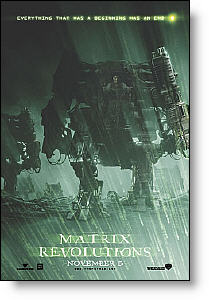
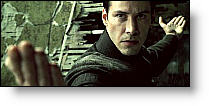
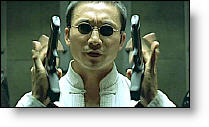
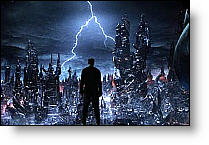

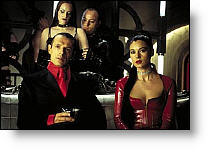
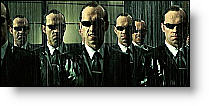
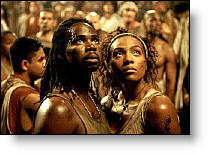

“The Matrix” trilogy includes some Taoism. “There is no spoon!” “Free your mind!” When Morpheus explains the matrix to Neo, he says “it is everywhere, it surrounds us even in this room, you can see it if you look out the window or when you turn on the TV.” That is a good description of Tao, the supposed power behind everything which keeps the universe going. Tao is supposedly everywhere, but cannot be seen or heard.
Taoism—What is it and what’s wrong with it? Answer
“The Matrix” trilogy promotes Monism at times. What is Monism ? Who believes in Monism? Is it biblical? Answer
What is the significance of the New Age Movement? Answer
Why is the world the way it is? (filled with lies, oppression, suffering, death and cruelty) Answer
In “The Matrix” sci-fi trilogy, most of humanity is deceived by an evil lie and love, faith, hope, and freedom of choice are shown to be of great importance and key to our future. In reality, this is very true of our own world. ChristianAnswers provides free, online viewing of a beautiful, highly-acclaimed motion picture that clearly explains the true history of mankind and reveals how humanity can be saved from the deceptions and evil that are dragging us down to destruction. Watch The HOPE now!
Neo is a flawed messiah. Learn about the true and perfect Messiah for the human race—GO…
What is the importance of faith for a Christian? Answer
Faith—Elevators Can Let You Down (by Ray Comfort)—GO…
| Featuring |
|---|
| Keanu Reeves, Carrie-Anne Moss, Laurence Fishburne, Hugo Weaving, Jada Pinkett-Smith |
| Director |
|
Larry Wachowski Andy Wachowski |
| Producer |
|
Joel Silver |
| Distributor |
Also see our reviews of: The Matrix and The Matrix: Reloaded
Following the groundbreaking sci-fi masterpiece that was 1999’s “The Matrix” and the astonishing action/special effects triumph (though the story struggled somewhat) that was May’s “The Matrix Reloaded”, film fans everywhere have been anticipating how the directorial duo of brothers Larry and Andy Wachowski would wrap up their epic trilogy.
I must admit, although I absolutely loved the first Matrix film on every level, I was mildly disappointed with Reloaded’s dragging plot and confusing finish. However, that disappointment was tempered by two of the most amazing action sequences ever put on film and the hope that the story would get better attention and satisfactory resolution in the trilogy’s final chapter (parts two and three, filmed together, are essentially one movie cut in half, a la Quentin Tarantino’s “Kill Bill”). That final piece of the complex puzzle has arrived in “The Matrix Revolutions”, another towering technical achievement that unfortunately leaves us with a decidedly mixed bag emotionally.
“Revolutions” picks up where “Reloaded” left off, with a comatose Neo (Keanu Reeves) trapped between the real world and the Matrix. On the advise of the Oracle (Mary Alice replaces the late Gloria Foster, with a very sketchy explanation given), Morpheus (Lawrence Fishburne) and Trinity (Carrie-Anne Moss) head into the Matrix to rescue Neo from the grasp of the powerful Merovingian (Lambert Wilson).
After his rescue, Neo must make the decision to separate from his friends. Thus the story proceeds with Morpheus returning to Zion, soon to come under machine attack, with Niobe (Jada Pinkett Smith), Link (Harold Pirrineau, Jr.) and their crew, and Neo and Trinity heading off to the machine city to stop Agent Smith (Hugo Weaving), who is growing out of control and threatens to destroy not just the Matrix, but the whole world.
The movie starts off with what I like to call “Reloaded sickness,” a first act that has way too much pointless, self-conscious dialogue and too little action. Thankfully, unlike “Reloaded”, the film eventually pulls itself out of that rut and once it gets going, becoming a non-stop spectacle all the way to the end.
The scenes of thousands of machine sentinels attacking the human city of Zion are amazing to watch, with the CG work about as good as it gets. The battle sequence is loud, relentless, and as action goes, second to none. The climactic duel between Neo and Smith is beautiful to watch as they fight and tumble through the pouring rain in the streets of the Matrix, now totally dominated and corrupted by Smith and his copies.
All these elements are intertwined with small aspects of the story being explained and wrapped up, leading the viewer to believe that they are headed towards a magnificent and epic conclusion. However, the film never pays off. Though there is no doubt that “Revolutions” is a spectacular achievement in action films, as the end of an epic trilogy it is found significantly lacking.
Without giving too much away, when the dust settles we’re still left somewhat wondering, and quite frankly, apathetic. Since we’re not altogether sure what has been accomplished, it is very hard to care about the future of the characters. Though I’m sure the ending makes perfect sense to the Wachowskis (and to be fair, the struggle between Neo and Smith ends the only way it can end, given some revelations about their natures in this film), but they forgot to tell the rest of us exactly what it means—leading to a conclusion that leaves viewers feeling cheated.
The film is also marred by some character problems, particularly that there are too many of them. The Merovingian is more a catalyst than a character (though I don’t think the Wachowskis realized this), and Monica Bellucci’s Persephone is completely worthless. Thankfully, Niobe pays off in this film, but other characters such as Link, Zee, and the young Sati (Tanveer Atwal) could have been completely discarded. There is some bad acting and dialogue, with some parts almost as painful as Morpheus’ big speech in “Reloaded”.
There are also a couple big plot twists involving main characters late in the movie that actually end up hurting the film.
In the end, though I prefer this film to “Reloaded”, my admiration for it is very similar to that film. As an action film in and of itself it is spectacular, a great adrenaline rush with some amazing effects. Thus, like “Reloaded” it is a fun movie to watch and undeniably a great accomplishment.
The Trilogy
However, it pains me to say that as a cohesive epic trilogy “The Matrix” ultimately fails. The first film is a stand-alone classic in every sense, and the two sequels are wonderful action films in their own right, and I recommend them as such, but as one grand, involving story, it just simply leaves us disappointed. If you’re looking for a great epic trilogy, check out the beautifully masterful “Lord of the Rings”, or the tremendously fun “Star Wars”, but leave “The Matrix” on the shelf.
Yet, if you’re looking for one tremendous sci-fi adventure and two really good sci-fi action flicks, the Wachowski brothers have certainly produced some amazing examples.
Violence: Heavy | Profanity: Moderate | Sex/Nudity: Heavy


[Average / 4]
[Average/5]
[Average / 3]
[Average / 4]
Ultimately, it shows that “The Matrix” trilogy is a very daring one in the sense that it doesn’t aim to answer all the questions… it lets the audience experience it and try to figure it out on their own. Very neat movie overall however it is definitely intended for mature audiences.
[Average / 4]
[Average/3]
[Average/4]
I hoped that Revolutions would redeem its predecessor, but like the critic in this Web-site, it left me longing for some sort of closure/explanation. While I appreciated the last words after this “messiah’s” death: “It is done.” (Christ/Father’s confirmation that Christ had completed His work on Earth), naively and in a gullable way I was expecting some sort of redemption/forgiveness/salvation clear explanation through the eyes of what lay ahead in the future—especially given the fact that this messiah had come back to life in the first movie, I was expecting it to be an allegory of Christ’s second coming, in terms of hearing trumpets, singing of their own version of angels and the showing of this mesiah’s glory. But hey, what can I expect from a group of non-believers who are still searching for the one and only truth (Jesus)? The sad part of all of this is that, like Jim Carrie in Bruce Almighty, all these men and women have heard the message (Gospel) but still refuse to accept it…
[Better than Average/3]
Unfortunately, too many Christians disregard such actions against our Lord and concentrate only on nudity as its only moral failing. This movie did have incredible fight scenes and almost flawless CGI work, but the acting was sporadic at best and I had a real problem connecting with Trinity and Neo. Though their relationship is supposed to be deep, it always seemed very shallow to me. In the end, the story is a flop. The Matrix gets props for its inventive camera work and slow motion use, but its story left me both disappointed and highly offended.
[Very Offensive/1]
The answers being left up to the viewer is just how Satan would love for us to live our lives, WE make the determination of morality and how to live it out. Neo was not even a fair representation of a “messiah” like character, and had no concept of what he was supposed to do until the very last moment. There were simply too many inconsistencies in how they (the Wachowskis) presented him (Neo). The film was severely slanted to Eastern religion and thinking, much as the actors have described in some interviews that they are now somewhat pre-disposed in life.
For me, Revolutions left way more questions than answers, and that can be a good thing if you see or saw this film with an unbelieving friend or relative. /
[Average/4]
[Very Offensive/1]
To tell the truth, it really had nothing to do with what the people in the club were doing because it all just seemed like dancing to me… but there was just a serious feeling of deep sin surrounding the whole scene. I must admit, and you might think I’m lying, but I never saw the topless woman. Maybe G-d was protecting my eyes because my husband and my friends all saw her, but I didn’t. Third, there is some graphic violence that can be pretty disturbing.
Now the positive… the CG stuff was AWESOME!!! I was literally in awe when the sentinels were all coming out in droves and just zooming everywhere. The fight scene (Neo vs. Smith) was captivating and well choreographed. The script was a million times better than Reloaded… in fact, the whole movie was. But after all that… I’m still not sure about the end. I don’t actually understand it. I’m going to have to study the movie again to draw a final conclusion. I would definitely not take anyone under 16 to see the movie, as it is very involved in many different ideas and culture extremes. I liked it, but my husband and I are not going to buy it.
[Extremely Offensive / 4]
Without giving too much away about that particular scene, it reminded me of how our savior went off to pray to God and contemplate the arduous task that was laid out before him. I am shocked to hear to read of how some of the other reviewers stated that there was much sexual content and other things regarding to that. Besides the one scene in the dance erotic dance club, there was no other sexuality or nudity. And the brief nudity is so brief I had to ask my friend if I saw what was on the screen—it went so fast, and overall raunchiness of the dance club scene lasts like what… 1-3 minutes tops?
Language maybe an issue, but I know I’ve seen many movies far more foul and immoral than this one (though I am not condoning it at all). Though I see how the movie could end like this, I am not too fond of why the Wachowskis brothers did write the ending the way it was. It could have been much more intellectually put together, or maybe they wanted to leave us with questions as to discuss it and come up with your own vision.In other words, if you like The Matrix, and you could manage through Reloaded, you’ll enjoy Revolutions.
[Average / 4]
[Average / 4]
Then, of course, there is a large amount of violence. Added to the violence is more blood than the previous movies, but it isn’t excessive. Plot-wise I enjoyed it much more than “Reloaded”. It kept my attention much easier. They also made the characters less stiff. Even so, I was disappointed with Fishbourne’s performance in this as in Reloaded (see the original Matrix and Othello to see his capabilities). Also, the actress who portrayed the Oracle this time (due to the death of the original actress) could not deliver her lines with the same presence and conviction of the other actress.
Also there is much more action, but I think it is also much better in this movie than in “Reloaded”. I didn’t think it dragged on as much as in “Reloaded”, and the climatic fight at the end was very well done. Overall, I liked it much more than “Reloaded” (but not more than the original), and I cannot say this enough: if you left the series after “Reloaded”, try “Revolutions”.
[Very Offensive/3]
[Better than Average/4]
[Better than Average/5]

“Revolutions” is not a movie for younger viewers; the level of violence and mature sexuality is consistent with the earlier movies. The concepts are well over the heads of anyone younger than 14. However, it is this very quality, of considering hugely important issues such as free will, sacrifice, and mercy, that make the series a valuable tool for discussion with older teens and adults. For those who wish it, “Revolutions” can be a jumping-off point to talk about Christian values and morality in a newly relevant way with older teens. “Matrix Revolutions” engages us in intelligent consideration of spiritual themes that popular culture usually tries to ignore, while providing a satisfying ending to this complex series.
My Ratings: [Average/4]